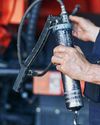Intentar ORO - Gratis
THE Do's AND DON'Ts OF SETTING CONTAMINATION CONTROL OBJECTIVES
MACHINERY LUBRICATION INDIA
|July - August 2022
It is pretty well understood, or at least widely stated, that what gets measured gets done. So it should come as no surprise that contamination control objectives should be implemented; they are our means of measuring the effectiveness of our equipment relubrication processes, not to mention how many of our other contamination control measures are going. When we set these objectives, though, we need to keep a few things in mind: consider this the Do's and Don'ts of setting contamination control objectives.

More about this ASCEND™ Factor
Factor: C3M - Contamination Control Objectives
Level: Management and Training (M)
Stage: Contamination Control & Lubricant Reconditioning
About: Implementing contamination control objectives and goals increases machine reliability. Highly critical machines should have stringent objectives.
Learn More: noria.com/ascend/
DO
Do set measurable and achievable goals.
Having solid goals that you can actually hit makes a huge difference, not just for the equipment but also for the entire reliability team. How frustrating would it be to have a goal that can never be achieved? Look at your process, operating conditions, lubricant demands, machine demands and criticality, and see what makes sense for your capabilities and reliability goals. "Pie in the sky" dreams are great, but we live in the real world, and we need real goals.
DON'T
Don't set a blanket statement and make it "the goal." We can't just say, "I want clean oil in all of our equipment," and call it a day. We can't measure this in any meaningful way, and we don't even have a definition of "clean" to shoot for. ISO cleanliness codes are a simple way to start on this.
DO
Do create a standard for how we are going to go about reaching the goals.
Esta historia es de la edición July - August 2022 de MACHINERY LUBRICATION INDIA.
Suscríbete a Magzter GOLD para acceder a miles de historias premium seleccionadas y a más de 9000 revistas y periódicos.
¿Ya eres suscriptor? Iniciar sesión
MÁS HISTORIAS DE MACHINERY LUBRICATION INDIA

MACHINERY LUBRICATION INDIA
PREDICT OIL USEFUL LIFE WITH REAL-TIME DATA
Oil is the life of any hydraulic or lubrication system.
8 mins
November – December, 2025

MACHINERY LUBRICATION INDIA
HOW THE RIGHT LUBRICATION TOOLS AND HARDWARE INFLUENCE MACHINE RELIABILITY
Having spent a good portion of my career around heavy machinery, both in the military and later in the civilian world, I’ve come to realize one critical fact: the tools you use matter just as much as the skills you have.
4 mins
November – December, 2025

MACHINERY LUBRICATION INDIA
Unlocking the Power of Oil Analysis & Particle Counting
Lubrication practices ensure peak performance and longev ity in machinery maintenance.
4 mins
November – December, 2025

MACHINERY LUBRICATION INDIA
BEYOND THE LABEL: UNDERSTANDING LUBRICANT TECHNICAL AND SAFETY DATA SHEETS
Over the years in lubrication, I have noticed that many professionals either overlook or misinterpret lubricant datasheets, especially Product Datasheets (PDS), which are key to selecting the proper lubricant. While Safety Datasheets (SDS) are widely known due to compliance requirements, the PDS holds the technical insights needed for informed decision-making. Yet, it is often misunderstood or ignored.
3 mins
November – December, 2025

MACHINERY LUBRICATION INDIA
SMART FILTRATION IN HEAVY INDUSTRIES:
PROTECTING WORKERS IN CEMENT AND STEEL MANUFACTURING
5 mins
November – December, 2025

MACHINERY LUBRICATION INDIA
IOCL & INFINEUM FORGE STRATEGIC LUBRICANT PARTNERSHIP
Infineum India and Indian Oil Corporation Limited (IOCL) have signed a strategic Memorandum of Understanding (MoU) aimed at deepening their collaboration to unlock long-term business value and drive innovation in India's mobility sector. The agreement was formalized at IOCL's Mumbai office, with Bakim Patra, Executive Director (Lubes) at IOCL, and Harshad Jambaulikar, General Manager of Infineum India, as the principal signatories.
1 min
November – December, 2025

MACHINERY LUBRICATION INDIA
CONTAMINATION REALIZATION: A CASE EXAMPLE AT A STEEL MILL
Condition monitoring, contamination control, lubrication excellence, and machine reliability are keywords that are often overused and misunderstood.
6 mins
November – December, 2025

MACHINERY LUBRICATION INDIA
BREAKING DOWN THE BASICS: A LESSON IN ASSET RELIABILITY
Before you go marching down to your reliability engineers and ask questions like, “What are the top 10 worst performing assets in our production line?”, it’s important to know the actual difference between an asset and reliability.
7 mins
November – December, 2025

MACHINERY LUBRICATION INDIA
EFFECTIVE USE OF THE PATCH TEST FOR SIMPLE ON-SITE ANALYSIS
The very best oil analysis programs incorporate some degree of onsite analysis. For most plants, mills, and mines, particle monitoring is the most productive onsite oil analysis activity available.
4 mins
November – December, 2025
MACHINERY LUBRICATION INDIA
CAFFEINE VS. CALM: FINDING THE RIGHT ENERGY BALANCE DURING WORK HOURS
For many of us, the workday doesn't officially begin until the first sip of coffee. In industrial and corporate settings alike, caffeine is often seen as a silent coworker, fueling early mornings, long shifts, and back-to-back meetings.
2 mins
November – December, 2025
Translate
Change font size
